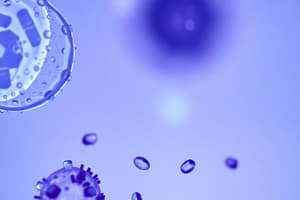Podcast
Questions and Answers
Wat is het belangrijkste doel van transcriptie en translatie in cellen?
Wat is het belangrijkste doel van transcriptie en translatie in cellen?
- De synthese van DNA
- Het reguleren van de celcyclus
- De afbraak van cellulaire afvalstoffen
- De synthese van eiwitten (correct)
Hoe communiceren cellen voornamelijk in multicellulaire organismen?
Hoe communiceren cellen voornamelijk in multicellulaire organismen?
- Door middel van signalen via directe contact en lokale mediatoren (correct)
- Via eiwitafbraak
- Door volledig afzonderlijke functies zonder interactie
- Alleen via hun celkern
Wat is een van de belangrijkste functies van celcommunicatie?
Wat is een van de belangrijkste functies van celcommunicatie?
- Verhogen van de celgroei alleen
- Het vastleggen van enzymen
- Het genereren van lichaamswarmte
- Coördineren van celactiviteiten (correct)
Wat omvat het transporteren van stoffen door de cel?
Wat omvat het transporteren van stoffen door de cel?
Welke van de volgende functies is essentieel voor het handhaven van homeostase?
Welke van de volgende functies is essentieel voor het handhaven van homeostase?
Wat is de functie van ribosomen in een cel?
Wat is de functie van ribosomen in een cel?
Wat is een verschil tussen prokaryote en eukaryote cellen?
Wat is een verschil tussen prokaryote en eukaryote cellen?
Welke organel is verantwoordelijk voor de energieproductie in de cel?
Welke organel is verantwoordelijk voor de energieproductie in de cel?
Wat doen lysosomen binnen een cel?
Wat doen lysosomen binnen een cel?
Wat is de belangrijkste functie van het endoplasmatisch reticulum?
Wat is de belangrijkste functie van het endoplasmatisch reticulum?
Welke functie heeft chloroplast in plantencellen?
Welke functie heeft chloroplast in plantencellen?
Wat is met name niet betrokken bij het metabolisme van een cel?
Wat is met name niet betrokken bij het metabolisme van een cel?
Welke functie heeft de plasma membraan?
Welke functie heeft de plasma membraan?
Flashcards
Cel
Cel
De kleinste functionele eenheid van levende organismen.
Plasmamembraan
Plasmamembraan
Het buitenste membraan van een cel dat de passage van stoffen regelt.
Prokaryotische cel
Prokaryotische cel
Eencellig organisme zonder membraangebonden organellen.
Eukaryotische cel
Eukaryotische cel
Signup and view all the flashcards
Mitochondrion
Mitochondrion
Signup and view all the flashcards
Celademhaling
Celademhaling
Signup and view all the flashcards
Fotosynthese
Fotosynthese
Signup and view all the flashcards
Ribosoom
Ribosoom
Signup and view all the flashcards
Transcriptie en translatie
Transcriptie en translatie
Signup and view all the flashcards
Celcommunicatie
Celcommunicatie
Signup and view all the flashcards
Homeostase
Homeostase
Signup and view all the flashcards
Celfunctie
Celfunctie
Signup and view all the flashcards
Signaaltransductie
Signaaltransductie
Signup and view all the flashcards
Study Notes
Introduction to Biology
- Biology is the scientific study of life.
- It encompasses a diverse range of organisms, from microscopic bacteria to large mammals.
- Key themes in biology include evolution, genetics, and ecology.
Cell Biology
- Cell biology is the study of the basic structural and functional units of life, the cells.
- All living organisms are composed of cells, either as single-celled organisms or complex multicellular organisms.
- Cells are highly organized structures, containing various organelles with specialized functions.
Cell Structure
- Plasma Membrane: The outer boundary of the cell, regulating the passage of substances in and out. It is selectively permeable.
- Cytoplasm: The jelly-like substance filling the cell, containing organelles.
- Nucleus (Eukaryotic cells): The control center of the cell, containing DNA, which stores genetic information.
- Ribosomes: Involved in protein synthesis. Found in both prokaryotic and eukaryotic cells.
- Endoplasmic Reticulum (ER): A network of membranes involved in protein and lipid synthesis. Rough ER has ribosomes, smooth ER does not.
- Golgi Apparatus: Modifies, sorts, and packages proteins and lipids for secretion or use within the cell.
- Mitochondria: The powerhouses of the cell, responsible for cellular respiration and energy production. Double membrane structure.
- Lysosomes: Membrane-bound sacs containing digestive enzymes, breaking down waste materials and cellular debris.
- Vacuoles: Storage sacs, playing different roles in different cell types. Often much larger in plant cells.
- Chloroplasts (Plant cells only): Contain chlorophyll, enabling photosynthesis. Double membrane structure.
Prokaryotic vs. Eukaryotic Cells
- Prokaryotic: Smaller, simpler cells lacking membrane-bound organelles. Examples include bacteria and archaea.
- Eukaryotic: Larger, more complex cells containing membrane-bound organelles. Examples include animals, plants, fungi, and protists.
Cellular Processes
- Metabolism: The sum of all chemical reactions that occur within a cell.
- Respiration: The process by which cells break down glucose to release energy in the form of ATP.
- Photosynthesis: The process by which plants and other organisms convert light energy into chemical energy.
- Cell Division: The process by which cells reproduce, essential for growth, repair, and reproduction. Types include mitosis (somatic cells) and meiosis (gametes).
- Transcription & Translation: The processes by which genetic information in DNA is used to synthesize proteins.
Cell Communication
- Cellular communication is crucial to coordinating cell activities in multicellular organisms.
- Signals can be transmitted through direct contact, through the use of local mediators, or via long-distance signaling.
- Signal transduction pathways are involved in the cellular response to these signals.
Cell Function
- Maintaining homeostasis: regulating internal conditions.
- Responding to stimuli: adjusting to changes in the environment.
- Transporting substances: moving materials across the cell membrane.
- Utilizing energy for cellular processes: Respiration and Biosynthesis.
- Synthesizing proteins necessary for vital cellular functions.
- Cell division and differentiation in development (especially important in multicellular organisms).
Studying That Suits You
Use AI to generate personalized quizzes and flashcards to suit your learning preferences.




